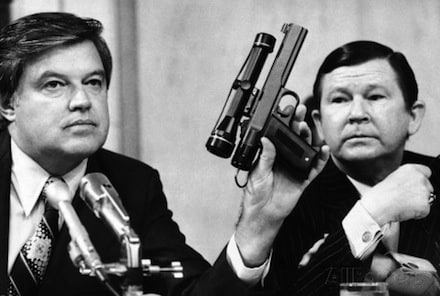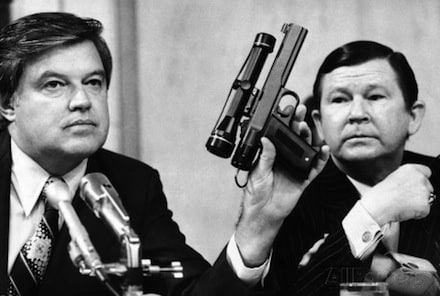
“Hey, guys, we’ll be here long after you are gone,” gloated a high-ranking CIA official during a hearing of the US Senate’s “Church Committee” investigation of illegal domestic intelligence operations forty years ago. What this meant, according to Peter Fenn, Senator Church’s Chief of Staff, “was, `we’ll wait you out.’”
Church, an Idaho Democrat who briefly ran for his party’s presidential nomination in 1976, had served in Army Intelligence during World War II and had supported the disastrous Gulf of Tonkin Resolution in 1965. As today’s Idaho Statesman recounts, Church took the initiative in creating the Senate panel — formally known as the Senate Select Committee to Study Governmental Operations with Respect to Intelligence Activities — after reading Seymour Hersh’s December 1974 revelations regarding the CIA’s criminal conduct on the domestic front.
Rod Gramer, author of a biography of Church, points out that the senator was outraged to see the US government “engaging in tactics he associated with the Soviet KGB.
“He used to say that when we start acting like our enemies, we start looking like our enemies,” Gramer recalls.
Decades before the heroic and self-sacrificing disclosures by NSA whistleblower Edward Snowden, Church’s panel “shed more light on the agency than any prior inquiry, including the existence of a program called Project Shamrock, which intercepted all telegraphs entering or leaving the country,” relates the Statesman. “The NSA had spied on Church for years as a part of Project Minaret, a warrantless electronic surveillance program it operated in the late ’60s and early ’70s. Minaret spied on Martin Luther King Jr., Muhammad Ali and several journalists, all without warrants. The senators the NSA spied on included Howard Baker, R-Tenn., who later served as White House chief of staff under President Ronald Reagan. The NSA fought to keep the identities of those it spied on secret until 2013.”
Working in tandem with a House Committee headed by New York Democratic Rep. Otis Pike, Church exhumed details of the CIA’s universal criminal conduct — from inept assassination attempts targeting Fidel Castro to successful coups in Guatemala, Iran, and Chile, to the macabre MK-Ultra mind control experiments.
Church, a relatively conservative Democrat of internationalist leanings, was a casualty of the November 1980 Reagan landslide, which carried Republican Congressman Steve Symms into office. Some conservative organizations which are grudgingly fighting against today’s Homeland Security State helped bring about the ouster of the principled liberal senator who had tried to derail that juggernaut decades ago. At the time, Church was accused of undermining “national security” — an accusation now hurled at Senator Rand Paul by contemporary neo-cons. It became commonplace — especially in southeastern Idaho, the deeply conservative section of the state where I went to high school and college — to hear Senator Church denounced as a species of Communist sympathizer.
An illustration of the depth and intensity of the resentment toward Frank Church was a politically themed float that appeared during halftime at a football game in St. Antony a few weeks before the 1980 election. As we gathered in the locker room I muttered to a teammate that it seemed a little odd to see a campaign advertisement at at High School football game. Coach Hailey, who hadn’t been satisfied with my first half performance at fullback, barked a deserved rebuke in my direction. On the victorious bus ride home I idly wondered if Frank Church was, as many people sincerely seemed to believe, working for the Soviets by undermining our own intelligence agencies. Decades later I find myself astonished by my own gullibility.
Frank Church was a politician, with all of the liabilities that term implies. More importantly, however, he was an enemy of the self-sustaining “deep state” and the security organs that protect it. If, rather than Red-baiting Church forty years ago, self-styled “constitutionalists” had listened to him, we wouldn’t be living in an American Soyuz today.
Reprinted with permission from LewRockwell.com.

